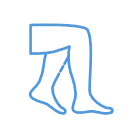Vitalis Physiotherapy MCL injury treatment is designed to:
Medial Collateral Ligament Injury (MCL injury) Treatment
Medial Collateral Ligament (MCL) is a band of tissue on the inside of the knee which connects the thigh bone to the lower leg bone. The purpose of the MCL is to keep the knee from bending inward.
If the ligament integrity is compromised, you may notice:
- Popping sound on injury
- experience mild or severe pain
- notice swelling or bruising around the knee
- feel that it has weakened or become somewhat unstable and wants to give way
- locking or catching
All these can be symptoms of MCL knee injury and the fastest recovery includes undergoing an MCL injury treatment.
Several factors affect the recovery period.
A milder MCL knee injury might only take a few days of resting, icing and keeping the leg elevated. However, some more serious conditions may take between 2 and 6 weeks to heal to a point where you can go back to normal and resume all your everyday and athletic activities.
In extreme cases, we advise people to opt for personalised MCL injury therapy. At Vitalis Physiotherapy, our team of trained professionals assesses your physical state, performs MCL injury test, and develop a rehabilitation plan which we believe will most efficiently facilitate your recovery.
There are three MCL knee injury categories created based on how compromised the ligament integrity is. The symptoms may vary: from only mild knee tenderness, localised swelling and instability, to extreme pain and knee laxity.
Should you notice any of the symptoms (even the mild ones if they turn into chronic issues), turn to Vitalis Physiotherapy team to talk about the problems you are experiencing and we will schedule you for an MCL injury test.
At Vitalis Physiotherapy, we first conduct an MCL injury test to provide the most accurate diagnosis. If we see that you are a candidate for medial collateral ligament injury treatment, we first educate you on the subject and introduce you to the process you are about to embark on.
Depending on the specifics of your case, we may or may not prescribe an orthotics device. It serves to provide much-needed support and protect you both when you are resting/sitting and when you are active (walking, running).
MCL Injury Grades
- Grade 1 – No swelling, only local tenderness, ligament integrity intact
- Grade 2 – Possible localised swelling, marked local tenderness, ligament integrity compromised with partial tear which leads to knee laxity
- Grade 3 – Swelling, a feeling of instability, mild pain, a complete tear of the ligament
Our MCL Injury Test and Treatment
- Dry needling
- Taping
- Soft tissue mobilisation
- Knee mobilisation
- Hinge brace prescription
- Orthotics prescription
- Gait scan
- Personalised MCL injury treatment and exercise program





